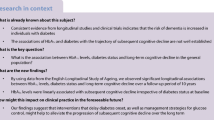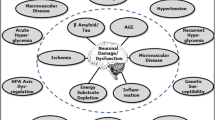Abstract
Purpose of Review
Research has consistently shown that type 2 diabetes (T2D) is associated with increased risk of all-cause dementia. Because one of the most common clinical presentations of early stage dementia is memory impairment, we examined the relationship of T2D with memory function, using the recently published scientific literature.
Recent Findings
We conducted a structured review to identify studies of “T2D and memory” published since 2015. After review of the 129 articles retrieved, we identified 14 studies meeting the inclusion and exclusion criteria. Among the eight studies with a single assessment of memory function in time (mostly cross-sectional), six found an association of T2D with lower memory function, but mostly in select subgroups of persons. Separately, six studies included repeated measures of memory (longitudinal design). Four out of six longitudinal studies found that T2D was related with a faster decline in memory, while two did not. Among the four studies showing a relation with memory decline, two had sample sizes of 9000–10,000 persons. Further, three longitudinal studies controlled for hypertension and stroke as covariates, and results suggested that common vascular risk factors and diseases do not account for the relation. While mechanistic studies clearly support a role for cerebrovascular disease in the relation of T2D with cognition, emerging data suggest that insulin resistance in the brain itself may also play a role.
Summary
Most, but not all, recently published studies suggest that T2D is associated with a lower level and faster decline in memory function. This association does not appear to be fully accounted for by common vascular processes. More research will clarify the mechanisms linking T2D to memory and dementia.
Similar content being viewed by others
References
Papers of particular interest, published recently, have been highlighted as: • Of importance
Ogurtsova K, da Rocha Fernandes JD, Huang Y, Linnenkamp U, Guariguata L, Cho NH, et al. IDF Diabetes Atlas: global estimates for the prevalence of diabetes for 2015 and 2040. Diabetes Res Clin Pract. 2017;128:40–50.
Kirkman MS, Briscoe VJ, Clark N, Florez H, Haas LB, Halter JB, et al. Diabetes in older adults. Diabetes Care. 2012;35(12):2650–64.
Tuttle KR, Bakris GL, Bilous RW, Chiang JL, de Boer IH, Goldstein-Fuchs J, et al. Diabetic kidney disease: a report from an ADA consensus conference. Am J Kidney Dis. 2014;64(4):510–33.
Gaster B, Hirsch IB. The effects of improved glycemic control on complications in type 2 diabetes. Arch Intern Med. 1998;158(2):134–40.
Vas PRJ, Edmonds ME. Early recognition of diabetic peripheral neuropathy and the need for one-stop microvascular assessment. Lancet Diabetes Endocrinol. 2016;4(9):723–5.
Chen R, Ovbiagele B, Feng W. Diabetes and stroke: epidemiology, pathophysiology, pharmaceuticals and outcomes. Am J Med Sci. 2016;351(4):380–6.
Fowler MJ. Microvascular and macrovascular complications of diabetes. Clin Diabetes. 2008;26(2):77–82.
Reijmer YD, van den Berg E, Ruis C, Jaap Kappelle L, Biessels GJ. Cognitive dysfunction in patients with type 2 diabetes. Diabetes Metab Res Rev. 2010;26(7):507–19.
Moloney AM, Griffin RJ, Timmons S, O’Connor R, Ravid R, O’Neill C. Defects in IGF-1 receptor, insulin receptor and IRS-1/2 in Alzheimer’s disease indicate possible resistance to IGF-1 and insulin signalling. Neurobiol Aging. 2010;31(2):224–43.
Whitmer R. Type 2 diabetes and risk of cognitive impairment and dementia. Curr Neurol Neurosci Rep. 2007;7(5):373–80.
Strachan MWJ, Reynolds RM, Frier BM, Mitchell RJ, Price JF. The relationship between type 2 diabetes and dementia. Br Med Bull. 2008;88(1):131–46.
Simó R, Ciudin A, Simó-Servat O, Hernández C. Cognitive impairment and dementia: a new emerging complication of type 2 diabetes-the diabetologist’s perspective. Acta Diabetol. 2017;54(5):417–24.
Zilliox L, Chandrasekaran K, Kwan JY, Russell JW. Diabetes and cognitive impairment. Curr Diabetes Rep. 2016;16.
Spauwen PJJ, van Boxtel MPJ, Verhey FRJ, Kohler S, Sep SJS, Koster A, et al. Both low and high 24-hour diastolic blood pressure are associated with worse cognitive performance in type 2 diabetes: the Maastricht study. Diabetes Care. 2015;38(8):1473–80.
Spauwen PJJ, van Eupen MGA, Köhler S, Stehouwer CDA, Verhey FRJ, van der Kallen CJH, et al. Associations of advanced glycation end-products with cognitive functions in individuals with and without type 2 diabetes: the Maastricht study. J Clin Endocrinol Metab. 2015;100(3):951–60.
Gao Y, Xiao Y, Miao R, Zhao J, Zhang W, Huang G, et al. The characteristic of cognitive function in type 2 diabetes mellitus. Diabetes Res Clin Pract. 2015;109(2):299–305.
Greenbaum L, Ravona-Springer R, Lubitz I, Schmeidler J, Cooper I, Sano M, et al. Potential contribution of the Alzheimer’s disease risk locus BIN1 to episodic memory performance in cognitively normal type 2 diabetes elderly. Eur Neuropsychopharmacol. 2016;26(4):787–95.
Marseglia A, Fratiglioni L, Laukka EJ, Santoni G, Pedersen NL, Bäckman L, et al. Early cognitive deficits in type 2 diabetes: a population-based study. J Alzheimers Dis. 2016;53(3):1069–78.
Geijselaers SLC, Sep SJS, Schram MT, van Boxtel MPJ, Henry RMA, Verhey FRJ, et al. Insulin resistance and cognitive performance in type 2 diabetes — the Maastricht study. J Diabetes Complicat. 2017;31(5):824–30.
• Geijselaers SLC, Sep SJS, Claessens D, Schram MT, van Boxtel MPJ, Henry RMA, et al. The role of hyperglycemia, insulin resistance, and blood pressure in diabetes-associated differences in cognitive performance—the Maastricht study. Diabetes Care. 2017;40(11):1537–47 A cross-sectional study, on the association of T2D and prediabetes with level of function in various types of cognitive domains including memory.
Van Gemert T, Wölwer W, Weber KS, Hoyer A, Strassburger K, Bohnau NT, et al. Cognitive function is impaired in patients with recently diagnosed type 2 diabetes, but not type 1 diabetes. J Diabetes Res. 2018;2018.
Beavers KM, Leng I, Rapp SR, Miller ME, Houston DK, Marsh AP, et al. Effects of longitudinal glucose exposure on cognitive and physical function: results from the action for health in diabetes movement and memory study. J Am Geriatr Soc. 2017;65(1):137–45.
• Marden JR, Mayeda ER, Tchetgen Tchetgen EJ, Kawachi I, Glymour MM. High hemoglobin A1C and diabetes predict memory decline in the health and retirement study. Alzheimer Dis Assoc Disord. 2017:48–54 A large study that found that T2D and A1C relate to a faster decline in memory function over a mean follow-up of 5 years.
Cholerton B, Omidpanah A, Verney SP, Nelson LA, Baker LD, Suchy-Dicey A, et al. Type 2 diabetes and later cognitive function in older American Indians: the strong heart study. Int J Geriatr Psychiatry. 2019;34(7):1050–7.
Callisaya M, Callisaya M, Beare R, Beare R, Moran C, Moran C, et al. Type 2 diabetes mellitus, brain atrophy and cognitive decline in older people: a longitudinal study. Diabetologia. 2019;62(3):448–58.
Bangen KJ, Gu Y, Gross AL, Schneider BC, Skinner JC, Benitez A, et al. Relation of type 2 diabetes with cognitive change in a multiethnic elderly cohort. J Am Geriatr Soc. 2015;63(6):1075–83.
• Demakakos P, Muniz-Terrera G, Nouwen A. Type 2 diabetes, depressive symptoms and trajectories of cognitive decline in a national sample of community-dwellers: A prospective cohort study. PLoS One. 2017;12(4):e0175827 A very large study that examines the longitudinal relationship between T2D and memory decline.
Arvanitakis Z, Wilson RS, Li Y, Aggarwal NT, Bennett DA. Diabetes and function in different cognitive systems in older individuals without dementia. Diabetes Care. 2006;29(3):560–5.
Arvanitakis Z, Wilson RS, Bienias JL, Evans DA, Bennett DA. Diabetes mellitus and risk of alzheimer disease and decline in cognitive function. Arch Neurol (Chicago). 2004;61(5):661–6.
Arvanitakis Z, Bennett DA, Wilson RS, Barnes LL. Diabetes and cognitive systems in older Black and White persons. Alzheimer Dis Assoc Disord. 2010;24(1):37–42.
Rajan K, Arvanitakis Z, Lynch E, McAninch E, Wilson R, Weuve J, et al. Cognitive decline following incident and preexisting diabetes mellitus in a population sample. Neurology. 2016;87(16):1681–7.
Arvanitakis Z, Schneider JA, Wilson RS, Li Y, Arnold SE, Wang Z, et al. Diabetes is related to cerebral infarction but not to AD pathology in older persons. Neurology. 2006;67(11):1960–5.
Pruzin JJ, Nelson PT, Abner EL, Arvanitakis Z. Relationship of type 2 diabetes to human brain pathology. Neuropathol Appl Neurobiol. 2018;44(4):347–62.
Pruzin JJ, Schneider JA, Capuano AW, Leurgans SE, Barnes LL, Ahima RS, et al. Diabetes, hemoglobin A1C, and regional Alzheimer’s disease and infarct pathology. Alzheimer Dis Assoc Disord. 2017;31(1):41–7.
dos Santos Matioli MNP, Suemoto CK, Rodriguez RD, Farias DS, da Silva MM, Leite REP, et al. Diabetes is not associated with Alzheimer’s disease neuropathology. J Alzheimers Dis. 2017;60(3):1035–43.
Stoeckel LE, Arvanitakis Z, Gandy S, Small D, Kahn CR, Pascual-Leone A, et al. Complex mechanisms linking neurocognitive dysfunction to insulin resistance and other metabolic dysfunction. F1000Research. 2016.
Arnold SE, Arvanitakis Z, Macauley-Rambach SL, Koenig AM, Wang H, Ahima RS, et al. Brain insulin resistance in type 2 diabetes and Alzheimer disease: concepts and conundrums. Nat Rev Neurol. 2018;14(3):168–81.
Talbot K, Wang H, Kazi H, Han L, Bakshi KP, Stucky A, et al. Demonstrated brain insulin resistance in Alzheimer’s disease patients is associated with IGF-1 resistance, IRS-1 dysregulation, and cognitive decline. J Clin Invest. 2012;122(4):1316–38.
Wang H, Capuano AW, Khan A, Pei Z, Lee K, Bennett DA, et al. Insulin and adipokine signaling and their cross-regulation in postmortem human brain. Neurobiol Aging. 2019;84:119–30.
Arvanitakis Z, Wang H, Capuano AW, Khan A, Taïb B, Anokye-Danso F, et al. Brain insulin signaling, Alzheimer disease pathology, and cognitive function. Ann Neurol. 2020;88(3):513–25.
Moran C, Callisaya M, Srikanth V, Arvanitakis Z. Diabetes therapies for dementia. Curr Neurol Neurosci Rep. 2019;19(8):1–9.
Udler MS, Kim J, von Grotthuss M, Bonàs-Guarch S, Cole JB, Chiou J, et al. Type 2 diabetes genetic loci informed by multi-trait associations point to disease mechanisms and subtypes: a soft clustering analysis. PLoS Med. 2018;15(9):e1002654.
Author information
Authors and Affiliations
Corresponding author
Ethics declarations
Conflict of Interest
Manvita Tatavarthy declares no potential conflicts of interest.
Zoe Arvanitakis reports grants from National Institutes of Health (R01 NS084965 and RF1 AG059621), during the conduct of the study; other from Amylyx, outside the submitted work.
David A. Bennett reports grants from National Institutes of Health (P30 AG10161, R01 AG015819, and R01 AG017917).
Human and Animal Rights and Informed Consent
This article does not contain any studies with human or animal subjects performed by any of the authors.
Additional information
Publisher’s Note
Springer Nature remains neutral with regard to jurisdictional claims in published maps and institutional affiliations.
Rights and permissions
About this article
Cite this article
Arvanitakis, Z., Tatavarthy, M. & Bennett, D.A. The Relation of Diabetes to Memory Function. Curr Neurol Neurosci Rep 20, 64 (2020). https://doi.org/10.1007/s11910-020-01085-9
Accepted:
Published:
DOI: https://doi.org/10.1007/s11910-020-01085-9




